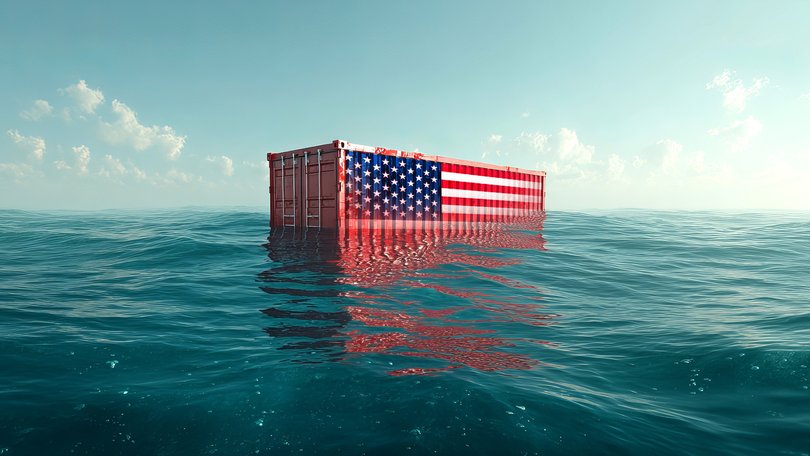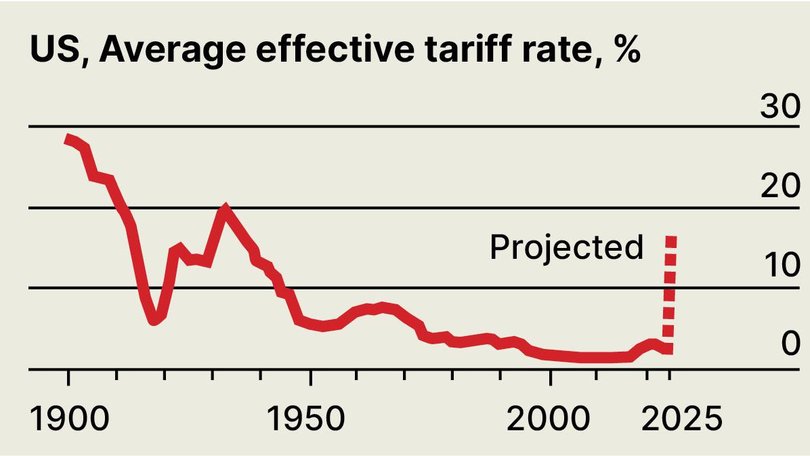THE ECONOMIST: America is treading water and cannot dodge the consequences of rising tariffs forever
THE ECONOMIST: The US is treading water as the economic impact of Donald Trump’s trade tariffs have been delayed but not averted.

Three months ago a tariff announcement by Donald Trump caused a market meltdown. More recently his proclamations have elicited a shrug. On July 7 America’s president published letters he had sent to 14 countries threatening “reciprocal” tariffs to be introduced by August 1, including levies of 25 per cent on Japan and South Korea.
The next day he said he would impose a 50 per cent charge on copper and, after a possible year and a half’s notice, up to 200 per cent on pharmaceuticals. Yet although the copper price soared, equity and bond markets seem unaffected. Panic has given way to placidity.
Everyone has a pet theory for this. One is that Mr Trump is not serious: most of the “Liberation Day” tariffs that caused the crash in April were postponed; the threat to impose similar tariffs in August seems empty.
Sign up to The Nightly's newsletters.
Get the first look at the digital newspaper, curated daily stories and breaking headlines delivered to your inbox.
By continuing you agree to our Terms and Privacy Policy.What the president really wants is trade deals, not trade barriers. Another is that lots of tariffs have been levied, but their impact has not been as bad as feared. A third is that Mr Trump will back off as soon as anything bad happens in the markets or the economy, and so it is not profitable to be pessimistic.
These arguments are inconsistent. They are also flawed. Take the policies that have gone into effect.
Although Mr Trump tempered his Liberation Day barrage, tariffs have been relentlessly creeping up. The average rate has reached around 10 per cent, compared with just 2.5 per cent last year.
The threatened August 1 and sectoral tariffs would raise that to 16-17 per cent, ie most of the way to the roughly 20 per cent that loomed over the economy in the spring.
Even the deals that have been struck, with Britain and Vietnam, have left in place much higher trade barriers than existed at the start of the year.
The federal government increasingly needs the money from high tariffs to help pay for Mr Trump’s One Big Beautiful Bill.
Contrary to received wisdom, these tariffs are hurting the economy. Consumption and retail sales have been weak.
America is on course to grow only about half as fast this year as it did in 2024. Inflation remains relatively low — but import prices show that American companies, not foreigners, are sparing consumers from the full burden of tariffs.
Many are probably trying to avoid raising prices in the hope of a reprieve. They can do so because they stockpiled imports at the start of the year. Eventually, though, higher costs will tell and prices will rise.
Inflation is likely to end the year above 3 per cent.

Relying on Mr Trump to chicken out before bad things happen is paradoxical. If markets do not react to announcements of damaging policies, then nothing is forcing him to back off. It is also complacent.
When Mr Trump avoids cliff-edges as big as Liberation Day, by raising tariffs gradually, the feedback from markets and the real economy is subtler.
The harm may not come from a crash, but America will surely grow more slowly than it would have — like Britain since Brexit.
Some of the worst fears from the spring have been proved wrong: retaliation against America has been limited. Mr Trump is right to think he has negotiating leverage, especially over smaller, trade-dependent economies.
But it is not in America’s interest to turn its tariff policy into a constant bilateral negotiation, as Mr Trump appears to wish.
Volatile trade policy encourages firms to pour their efforts into lobbying the government for changes and exemptions, rather than making their products better. So far, uncertainty has obscured the harm from tariffs, because companies and countries are waiting to see what unfolds.
But in the long run, uncertainty will become a cost in itself. Gradual corrosion in an economy is easier to ignore than a crisis, but it is no less harmful.
Originally published as America cannot dodge the consequences of rising tariffs forever
